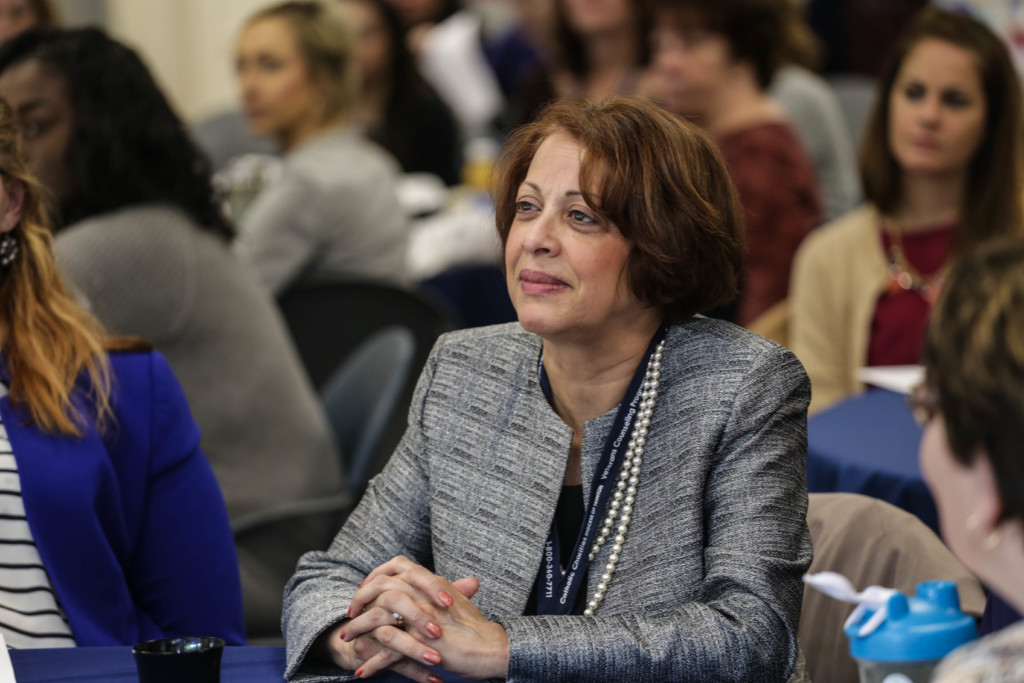Catholic Charities’ executive director calls for compassion, action in immigration policy
In recent weeks, the country has been deeply divided over national policy separating migrant families who cross the border to seek asylum in the United States, with adults sent to jail to face criminal charges and children as young as infancy placed in government custody or foster care.
After widespread protest and increasing concerns about inadequate detention space for the children, President Trump agreed last week to instead keep families together in detention. Still, more than 2,500 migrant children already were removed from their parents’ custody. While a few hundred have been reunited with their families, the fate of others remains uncertain.
Catholic Charities, Diocese of Trenton runs several immigration-support programs. Marlene Laó-Collins, executive director, said the current immigration crisis raises many troubling questions.

“The action along the border of separating children from their parents is inhumane, immoral, and contrary to Catholic values. The families crossing the border to seek asylum are fleeing extreme conditions of violence, abuse, and poverty. Parents who make this journey with their children in hand do so to escape those unbearable conditions and save their children’s lives. Yet instead of refuge, they encounter a nightmare – the loss of their children and a quagmire of bureaucracy that cares nothing about them as human beings with dignity. I cannot imagine the anguish of both parent and child, not knowing where the other is or when they will see each other.
“While the President has signed an executive order to stop the practice of family separation, the damage already has been done for many families. What will happen to the thousands of children already separated from their parents? Many have been moved to different locations, often to states far away from where their parents are being held. The process of tracking which child belongs to which adult remains unclear. And what happens to children if the parent gets deported? Forced family separations create severe stress, and traumatic events that occur during childhood can have lifelong, debilitating effects. Will both children and parents receive treatment to help them process the trauma they have faced?
“More broadly, we must restore dignity and justice to addressing the problems along the border. Turning away families who are fleeing domestic violence, gang violence, or extreme poverty is not the solution. Building a fence is not the solution – they will only die on the other side of the fence. We must stand true to our Catholic beliefs, in which every human life has equal value.
“There is responsibility in faith. As Catholics, we have a duty to help any stranger in need. I encourage all to pray for the reunification, health, and stability of separated families. It’s time to advocate for bipartisan legislative solutions for DREAMers that will protect them, keep our borders safe, and prevent further harm to families or other vulnerable immigrants. Support Catholic Charities, Diocese of Trenton so that we can continue our work assisting those who have been marginalized and are in most need.
“In the Gospel of Matthew, Jesus said: ‘Then he will say to those on his left, ‘Depart from me, you accursed, into the eternal fire prepared for the devil and his angels. For I was hungry and you gave me no food, I was thirsty and you gave me no drink, stranger and you gave me no welcome, naked and you gave me no clothing, ill and in prison, and you did not care for me.’ Then they will answer and say: ‘Lord, when did we see you hungry or thirsty or a stranger or naked or ill or in prison, and not minister to your needs?” He will answer them: ‘Amen, I say to you, what you did not do for one of these least ones, you did not do for me.” And these will go off to eternal punishment, but the righteous to eternal life.’ [Matt. 25:41-45]”
Catholic Charities, Diocese of Trenton provided immigration-support services to about 600 people last year in Burlington, Mercer, Monmouth and Ocean counties and currently is assisting several children affected by the national family separation policy, according to Carmen Pagan, who oversees immigration programs. These programs are available to anyone, regardless of religious affiliation. If you or someone you know is an immigrant in need of assistance, reach out to Catholic Charities today:
- Immigration Services in Ocean and Monmouth counties. Legal assistance and help completing immigration forms and filings. Contact: Giselle Gonzalez, (732) 363-5322, ext. 3236.
- Human Trafficking Assistance program. Support services for people who have overcome human trafficking (which in an immigration context typically involves forced labor or commercial exploitation). Contact: Maria Nikolatos, (732) 363-5322, ext. 3239.
- Family Reunification program. Stabilizing support services, such as housing assistance, trauma counseling, health care connections, school enrollment assistance and referrals, for families reunified with their relatives or sponsors after immigration-related separation. Contact: Mary Zeno, (732) 363-5322, ext. 3231.
- Community Services. Food pantry, clothing, housing and financial assistance. Mercer County: (609) 394-8847. Burlington County: (856) 764-6940. Ocean County: (732) 901-3261.
- El Centro in Mercer and Burlington counties. Legal assistance to help residents achieve citizenship and naturalization. Contact: (609) 394-2056.
To subscribe to our blog posts and news releases, fill out the fields below.

